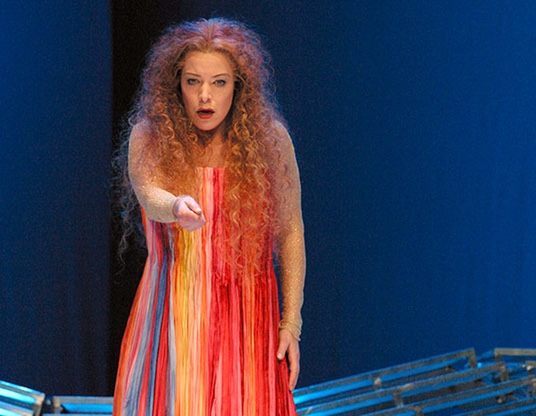
Sat 4/21, Thu 4/26 & Sun 4/29
Perfect for spring, new beginnings and romantic love: The Cleveland Orchestra’s concert version of Richard Wagner’s melancholy opera, Tristan und Isolde, with Franz Welser-Möst conducting, showed opening night just how doomed love may combine both beauty and tragedy (and it’s wonderful to listen as the legendary tale progresses).
The opera’s storyline, with origins traced at least to the twelfth century (even before King Arthur, Lancelot and Guinevere) concerns the elderly King Mark of Cornwall, who seeking a bride, decides upon the maiden Iseult (Isolde) of Ireland. Showing a lack of common sense, he sends his most gallant and handsome young warrior, Tristan, to fetch her. Of course, they fall in love on the way home. Their excuse (reason) is that they drank (unbeknownst to them) the magic love potion that Isolde was supposed to save for her wedding night.
Although this is not the place to psychoanalyze Wagner, let’s just say he was a bit of a womanizer himself, so he likely loved this idea: “It’s not my fault; it’s just magic made me do it.”
As Isolde, famous soprano Nina Stemme shows she’s still got “it,” and her gorgeous rendition of the famous “Liebestod,” perhaps opera’s most famous love song, rang out powerfully and gorgeously, despite coming at the end of the four-plus hour opera. “Liebestod” [literally in German a mash-up of words for “love” and “death”]. (If the aria is new to you, here’s a fine version by Stemme or this majestic version sung by Jessye Norman or another by the legendary Kirsten Flagstad.
Somewhat less convincing as Tristan, tenor Gerhard Siegel seemed unable to cast his voice over the orchestra (no mics in opera!). In contrast, bass Ain Anger as King Markebass radiated charisma (vocal and otherwise). Watching this production, one wonders why on earth Isolde didn’t just say “Thanks for the boat trip, Tristan,” and then “Oh, hello, your kingship” when meeting her future husband. Well, yes, it’s opera so of course lovers must die.
Mezzo-soprano Okka von der Damerau sang the role of Isolde’s handmaiden Brangäne so beautifully that I kept thinking of rivers of liquid honey (but have to reject this image since honey can be sticky). Her voice and her long golden hair fit perfectly into the ultra-romantic mode of this delightfully excessive account of doomed love. Bass-baritone Alan Held as the stalwart Kurwenal provided compelling vocal (and in the story, moral) support for Tristan.
The orchestra was, as ever, outstanding. Just to mention one example, the extended, offstage solo for English horn at the beginning of Act III, played with haunting beauty by Russ deLuna. As he played, the hall fell silent. Conductor Welser-Möst wisely put his hands down and stood motionless. It served both as a pause in the story “action” and as a warning of romantic ecstasy and death to come.
Other voices included those of baritone Sean Michael (as the ambitious Melot), tenor Matthew Plenk (as the Young Sailor/Shepherd) and baritone Francisco X. Prado (Steersman), plus the valiant men of the Cleveland Orchestra Chorus.
BOTTOM LINE: Go if you can, even if you think “Opera’s not for me.” The Cleveland Orchestra offers Tristan again on Thu 4/26 and Sun 4/29. It’s a rare chance to hear great operatic voices accompanied by a more than great orchestra.
[Written by Laura Kennelly]
Case Western Reserve University, Cleveland, OH 44106